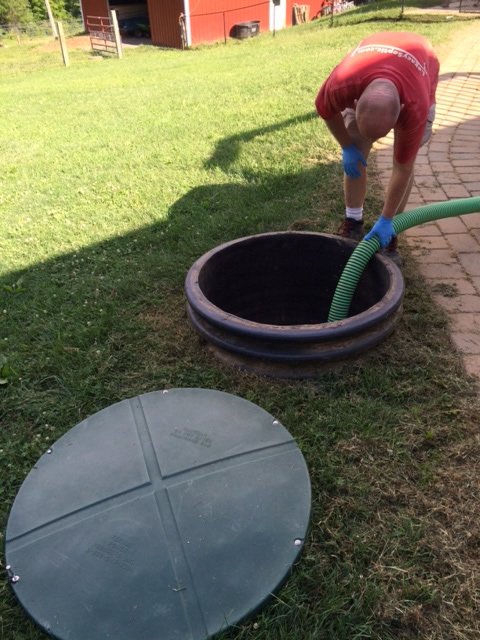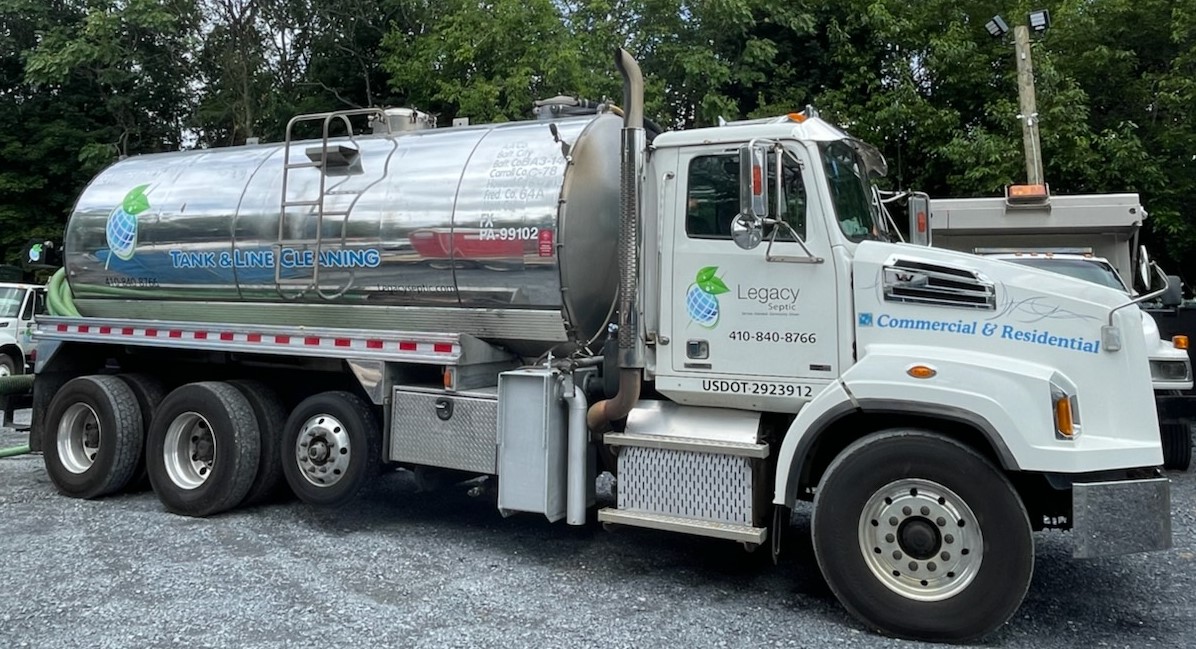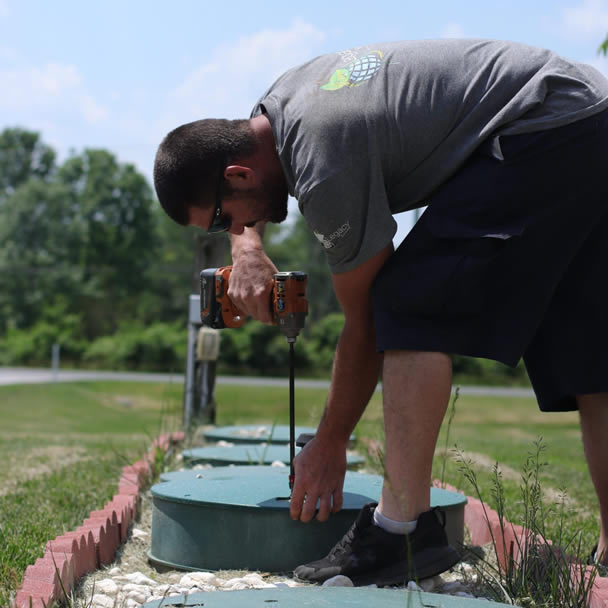Septic Pumping in Monkton, MD
Legacy Septic Pumping Services – What Residents in Monkton, MD Can Expect
When you choose Legacy Septic Services, we promptly coordinate with the local Health Department in Monkton, MD, to obtain records of your property’s septic system. Our technician then conducts a thorough inspection of your septic system to understand its intricacies and ensure that all necessary services are provided.
On the scheduled service day, our skilled technician arrives at your property and carries out the septic tank pumping. The technician carefully maps out the septic tank’s location and notes any challenges, such as access issues or the presence of pets, to determine the necessary amount of hose. In addition, measurements are taken, and observations are noted, to help determine the optimal frequency for your septic tank pumping services.
After the service is completed, our specialist reviews the gathered notes and measurements from your property file, addresses any necessary septic repairs, and offers recommendations and highlights concerns before finalizing your file.
At Legacy Septic Services, we understand that emergencies can occur at any time. That’s why we offer 24/7 emergency septic services. You can contact us anytime at 410-840-8766.
Legacy Septic Services is committed to providing you with exceptional septic services and ensuring the longevity of your septic system. Contact us today to schedule your septic service and experience the difference of working with a team that truly cares about your needs.
Why is it important to get your septic pumped?
Prevention of System Breakdowns: Solid wastes accumulate at the septic tank’s bottom as sludge, while lighter materials like oils and fats rise to form a scum layer. Without routine pumping, these solids can fill the tank, diminishing its operational efficiency and risking a total system collapse. Such failures might cause sewage to back up into the home or leak out, presenting serious health risks and necessitating costly repairs..
Ensures Operational Efficiency: Pumping the septic tank on a regular basis is key to preserving its functionality in processing household wastes. An efficiently managed system separates solids and liquids effectively, allowing for the safe dispersal of treated water into the drain field. This is crucial for preventing the leaching of contaminants into groundwater and soil.
Lifetime of the System: Although septic systems are built to last for decades, neglect can drastically reduce their effective lifespan. Routine upkeep, including pumping, guarantees the optimal performance of all system parts, thereby extending the system’s longevity and avoiding premature replacement expenses.
Environmental Protection: A functioning septic system adequately treats wastewater before it mixes with groundwater. Regular pumping prevents the overflow of solids from the tank into the drain field, averting the risk of untreated sewage polluting groundwater and soil. This contamination can have severe health implications for both humans and wildlife and may contribute to disease proliferation.
Compliance with Regulations and Enhancing Property Value: Local laws often mandate periodic septic tank inspections and pumping, with non-compliance leading to fines and legal complications. Moreover, a properly maintained septic system adds value to a property, reassuring prospective buyers of no imminent septic issues.
Pumping frequency is influenced by the tank’s size and the household’s occupancy, with a typical recommendation being once every 3 to 5 years. However, homes with garbage disposals, high water usage, or larger families may require more frequent services. A consultation with a septic system expert can help tailor a maintenance plan to meet your unique needs.
What is the septic pumping process?
Identifying the Tank Location: Initially, it’s imperative to determine the exact location of the septic tank. While some property owners are aware of their tank’s whereabouts, others might need professional assistance to find it. Experts in septic services utilize specialized equipment and techniques to pinpoint the tank’s location, even if it’s not immediately visible above ground.
Gaining Access to the Tank: After locating the tank, the next move is to access its interior. This step generally involves removing the soil over the tank’s access points. Modern septic systems are often equipped with risers that lead up to the surface, capped by accessible lids, eliminating the need for excavation. However, older models without risers may require digging to reach the lid.
Evaluating the Tank’s Condition: Before starting the pump-out, a technician might inspect the tank to gauge the levels of liquid and solid waste. This evaluation is crucial for understanding the tank’s overall condition and identifying potential issues such as leaks or structural damage.
Pumping the Tank: At the heart of the process lies the actual removal of the tank’s contents. This is accomplished using a specialized vacuum truck, which employs a potent pump to suction out the tank’s sludge, scum, and effluent, transferring it to the truck’s containment area.
Tank Inspection and Cleaning: With an empty tank, it’s easier for the technician to conduct a comprehensive inspection for any signs of wear or damage and to clean the tank’s interior. This may involve hosing down the tank walls to clear residual sludge and allow for a closer examination of the tank’s structural integrity.
Waste Disposal: The waste extracted from the septic tank is treated with utmost care, transported to a designated treatment facility where it undergoes environmentally responsible processing or disposal, in line with local regulatory standards.
Restoring the Site: Following the pumping, inspection, and potential cleaning, the tank’s lid is resealed. If the site was excavated to access the tank, the ground is filled in and returned to its original state as closely as possible.
Feedback and Documentation: The technician may offer guidance or suggestions based on the tank and system’s status, recommending repairs or adjustments in pumping schedules. Homeowners typically receive a detailed report of the services performed and any notable findings.
Consistent septic tank pumping is vital for preventing system breakdowns, extending the lifespan of your septic setup, and safeguarding environmental and public health. The recommended frequency for this maintenance varies, influenced by the tank size, household size, and wastewater volume produced.
How Often Should I Get My Septic Pumped?
Tank Size: The capacity of your septic tank directly influences how often it needs to be emptied. Larger tanks have a greater volume for accumulating solids, whereas smaller tanks reach capacity more quickly.
Household Size: The more individuals living in a home, the more wastewater and solid waste the septic system must handle, leading to quicker tank fill-up.
Water Consumption: The amount of water flowing through the septic system plays a crucial role. High usage results in faster accumulation of the solid layer within the tank.
Solids in Wastewater: Activities that increase solids, such as using a garbage disposal, doing laundry frequently, or other habits, can necessitate more frequent pumping.
Based on these factors, a basic guideline for septic tank maintenance intervals is:
- 1 to 2 occupants: Every 3-4 years
- 3 to 5 occupants: Every 2-3 years
- 6 or more occupants: Yearly or every 1-2 years
These recommendations serve as a starting point; the specifics of your situation may require adjustments. A smaller tank and a high number of occupants might mean more frequent servicing is necessary. Alternatively, a large tank with few users could allow for longer periods between services.
Adjusting household habits to lessen the load on your septic system, such as efficient water use, avoiding the disposal of non-biodegradable items, and steering clear of pouring grease or harmful chemicals down the drain, can also reduce the frequency of required pumpings.
Periodic professional inspections of your septic system are beneficial. A technician can evaluate the levels of sludge and scum, inspect for any damage or leaks, and tailor a pumping schedule to fit your tank’s condition and your usage patterns.
Being proactive with maintenance and mindful of your water use and waste disposal practices can prolong your septic system’s lifespan, helping to avert expensive fixes or replacements.

Request Pumping Service
"*" indicates required fields
Call Us
Text Us
Other Septic Services
Septic Installation
Legacy Septic excels in the precision installation of septic systems, tailoring each project to the unique requirements of your property. Our team, proficient in the latest technological advancements, dedicates itself to a process that is not only thorough but also adheres to the highest safety and efficiency standards. Starting from the initial soil evaluation and system planning to the comprehensive installation and final check-up, Legacy Septic guarantees a smooth and hassle-free journey. Our unwavering dedication to quality and customer contentment positions us as your dependable ally in securing dependable septic solutions. Opting for Legacy Septic means choosing a service committed to ensuring the durability and peak functionality of your septic system.
With Legacy Septic, the wait for your septic tank is minimal, as the only delay comes from obtaining the necessary permits!
Septic Preventive Maintenance
Preventive maintenance is essential to prolong the lifespan and enhance the efficiency of your septic system. Through consistent upkeep, you can prevent typical issues that often plague septic systems, keeping yours running smoothly.
Below is an overview of our preventive maintenance services for septic systems:
- Sewer Ejector Pump Preventive Maintenance Program
- Sandmound Preventive Maintenance Program
- BAT (Norweco) Septic Maintenance Program
Water/Sewer Line Repair
Regardless of being hooked up to the city’s water and sewage infrastructure, there’s still a chance you’ll require repairs for your water and sewer lines. Vulnerable to an array of damaging influences such as breakage, corrosion, tree root invasion, freezing conditions, wear and tear over time, and shifts in the ground, these pipelines can compromise your home’s safety and functionality. Legacy Septic is at your service with an extensive array of water and sewer line solutions, prepared to respond swiftly to safeguard your residence from potential harm.
About Legacy Septic
At Legacy, our purpose extends beyond mere service provision in the septic field; we are dedicated to educating. This commitment spans assisting first-time homebuyers, supporting current homeowners, or facilitating home sellers who are navigating the pressures of imminent closing dates. Our mission is to equip young couples with the critical knowledge needed to sidestep hidden problems that could affect their purchase decisions. We strive to offer insights to homeowners on practices that can improve the performance and extend the life of their septic systems. For those looking to sell their homes, especially as they approach retirement, ensuring the septic system is in top condition is vital for securing buyer confidence. Through initiatives aimed at educating the community and personalized visits to your property, we place a high value on earning and maintaining your trust.




About Monkton, MD
Monkton is an unincorporated community in northern Baltimore County, Maryland. It has a population of approximately 4,856 people. The community is 35 square miles in area, with approximately 138 inhabitants per square mile. As an unincorporated area, Monkton has no legally defined boundaries, and its ZIP code 21111 includes a portion of adjacent Harford County.
The community was named after Moncton, New Brunswick, by Robert Cummings, a Pennsylvanian. Cummings initially named it Monckton Mills in honor of Rosanna Trites, a former love who was among the Pennsylvania Germans who had moved to Moncton in 1765. Cummings had also gone to Moncton but returned in 1773 and settled at his uncle’s estate in this community. East of Monkton is an area named “My Lady’s Manor,” known for its horse farms, sprawling countryside, and old, stately homes set back from the country roads. In 1713, Charles Calvert, 3rd Baron Baltimore, decreed 10,000 acres for himself. He made a gift of this land to his fourth wife, christening the estate “My Lady’s Manor.” It was added to the National Register of Historic Places in 1978. Also listed on the National Register are the Corbett Historic District and St. James Church.
The founder and CEO of Squarespace, Anthony Casalena, is from Monkton. Filmmaker Erik Kristopher Myers shot the 2013 thriller Roulette at various public and private locations on York Road and Mt. Carmel Road, including the GBMC, the NCR Trails, and The Milton Inn.
Service Oriented. Community Driven.
Proudly serving Carroll, Baltimore, Howard and Frederick Counties, including Owings Mills, Reisterstown, Monkton, and Parkton for over 35 years!
Get Social With Us!
Contact Us!
2914 Hanover Pike
Manchester, MD 21102
Telephone: 410-840-8766
Email: info@legacyseptic.com
Text: 240-372-2744
© 2025. All Rights Reserved. | Privacy Policy




